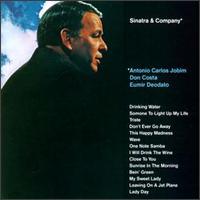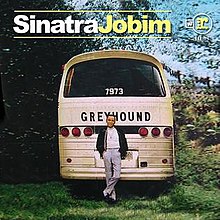Sinatra & Company
 From Wikipedia the free encyclopedia
From Wikipedia the free encyclopedia
| Sinatra & Company | ||||
|---|---|---|---|---|
 | ||||
| Studio album by | ||||
| Released | 1971 | |||
| Recorded | February 11, 1969 – October 29, 1970 Hollywood | |||
| Genre | Traditional pop, bossa nova,[1] soft rock | |||
| Length | 40:03 | |||
| Label | Reprise FS 1033 | |||
| Producer | Don Costa (tracks: B1 to B7), Sonny Burke (tracks: A1 to A7) | |||
| Frank Sinatra chronology | ||||
| ||||
| SinatraJobim | ||||
 The original artwork | ||||
| Review scores | |
|---|---|
| Source | Rating |
| Allmusic | |
| Mojo | |
Sinatra & Company is an album by American singer Frank Sinatra released in 1971.
The first side of this album is in the bossa nova style, and the second side is influenced by soft rock, featuring two songs from John Denver.
The bossa nova recordings were originally cut for a follow-up to the widely acclaimed Francis Albert Sinatra & Antonio Carlos Jobim. Arranged by Eumir Deodato, the recordings had been completed, the artwork finalized, and an 8-track tape release of the planned album, titled Sinatra–Jobim, briefly made available when the decision was made to retrench. Some of Sinatra's less mainstream albums hadn't performed well, and anxieties drove the creation of this hybrid.
Three songs recorded at the Sinatra-Jobim session – "Bonita", "Sabiá", and "Off Key (Desafinado)" – were omitted from Sinatra & Company. "Sabiá" was released in the US as the flip side of the 45 rpm single "Lady Day" (Reprise 0970) in 1970, and was included on the 1970 Warner/Reprise Loss Leaders sampler Schlagers!, as well as being issued along with "Bonita" on the 1977 compilation Portrait of Sinatra and the 1979 compilation, Sinatra–Jobim Sessions . "Off Key (Desafinado)" was unreleased until its inclusion on the box set The Complete Reprise Studio Recordings in 1995. In 2010 the Concord Records label issued Sinatra–Jobim: The Complete Reprise Recordings, a comprehensive collection of all the tracks recorded by Sinatra and Jobim.
A few 8-track versions of Sinatra–Jobim did survive, and are now eagerly sought after by collectors.[4]
Track listing
[edit]- "Drinking Water" (Vinicius de Moraes, Antônio Carlos Jobim, Norman Gimbel) – 2:35
- "Someone to Light Up My Life" (de Moraes, Jobim, Gene Lees) – 2:37
- "Triste" (Jobim) – 2:40
- "Don't Ever Go Away (Por Causa de Você)" (Ray Gilbert, Dolores Durán, Jobim) – 2:28
- "This Happy Madness (Estrada Branca)" (de Moraes, Jobim, Lees) – 2:57
- "Wave" (Jobim) – 3:25
- "One Note Samba (Samba de uma Nota Só)" (Jobim, Newton Mendonça, Jon Hendricks) – 2:20
- "I Will Drink the Wine" (Paul Ryan) – 3:30
- "(They Long to Be) Close to You" (Burt Bacharach, Hal David) – 2:34
- "Sunrise in the Morning" (Ryan) – 2:50
- "Bein' Green" (Joe Raposo) – 3:00
- "My Sweet Lady" (John Denver) – 3:01
- "Leaving on a Jet Plane" (John Denver) – 2:25
- "Lady Day" (Bob Gaudio, Jake Holmes) – 3:41
Charts
[edit]| Chart (1971) | Peak position |
|---|---|
| Australia (Kent Music Report)[5] | 23 |
Complete personnel
[edit]- Frank Sinatra – vocals
- Antônio Carlos Jobim – guitar, scat singing (tracks 1–7)
- Don Costa – arranger, conductor (tracks 8–14)
- Eumir Deodato – arranger (tracks 1–7)
- Morris Stoloff – conductor (tracks 1–7)
Tracks 1, 2:
12-February-1969 (Wednesday)- Hollywood. Western Recorders (from 8 to 11:30 P.M.).
Milt Bernhart, Dick Nash, Dick Noel (tbn); Ken Shroyer (b-tbn); John Cave, Vincent DeRosa, Arthur Maebe, Richard Perissi (fr-h); Buddy Collette, Paul Horn, Ronny Lang, Don Lodice, Ted Nash (sax/wwd); Israel Baker, Arnold Belnick, Bonnie Douglas, Jacques Gasselin, Bernard Kundell, Emo Neufeld, Lou Raderman, Sally Raderman, Paul Shure, Marshall Sosson, Joe Stepansky, Gerald Vinci (vln); Alvin Dinkin, Allan Harshman, Paul Robyn, Virginia Majewski (via); Armand Kaproff, Edgar Lustgarten, Jacqueline Lustgarten, Nino Rosso (vlc); Bill Miller, Eumir Deodato (p); Antonio Carlos Jobim (g/voc [I]); Chuck Berghofer (b); Francisco de Souza, Claudio Slon (d/perc). Eumir Deodato (arr. all titles); Morris Stoloff (cond).
Tracks 3, 5:
Milt Bernhart, Dick Nash, Dick Noel (tbn); Ken Shroyer (b-tbn); John Cave, Vincent DeRosa, William Hinshaw, Richard Perissi (fr-h); Paul Horn, Ronny Lang, Don Lodice, Ted Nash, Bud Shank (sax/wwd); Israel Baker, Thelma Beach, Arnold Belnick, Nathan Kaproff, William Kurasch, Emo Neufeld, Stanley Plummer, Lou Raderman, Sally Raderman, Raph Schaeffer, Joe Stepansky, Gerald Vinci (vln); Alvin Dinkin, Paul Robyn, Reuben Marcus, Allan Harshman (vla); Armand Kaproff, Ray Kramer, Edgar Lustgarten, Jacqueline Lustgarten (vlc); Bill Miller, Eumir Deodato (p); Antonio Carlos Jobim (g; voe [1]); Chuck Berghofer (b); Francisco de Souza, Joao Palma, Claudio Slon (d/perc). Eumir Deodato (arr. all titles); Morris Stoloff (cond).
Tracks 4, 6, 7:
11-February-1969 (Tuesday) - Hollywood. Western Recorders (from 8 P.M. to 12 M.).
Milt Bernhart, Dick Nash, Dick Noel (tbn); George Roberts (b-tbn); John Cave, Vincent DeRosa, William Hinshaw, Richard Perissi (fr-h); Buddy Collette, Paul Horn, Ronny Lang, Don Lodice, Ted Nash (sax/wwd); Israel Baker, Thelma Beach, Arnold Belnick, Harry Bluestone, Arthur Brown, Jacques Gasselin, Bernard Kundell, William Kurasch, Stanley Plummer, Lou Raderman, Sally Raderman, Joe Stepansky (vln); Alvin Dinkin, Allan Harshman, Paul Robyn, Virginia Majewski (via); Margaret Aue, Paul Bergstrom, Jacqueline Lustgarten, Joseph Saxon (vlc); Bill Miller, Eumir Deodato (p); Antonio Carlos Jobim (g, voe [1]); Ray Brown (b); Claudio Slon (d/perc). Eumir Deodato (arr. all titles); Morris Stoloff (cond).
Track 8:
Conte Candoli, Shorty Sherock, Ray Triscari (tpt); Dick Noel, Billy Byers (tbn); Robert Knight (b-tbn); Bob Hardaway, Harry Klee, Nino Tempo (sax/wwd); Thelma Beach, Arthur Brown, Kurt Dieterle, Jacques Gasselin, Emo Neufeld, Lou Raderman, Sally Raderman, Mischa Russell, Joe Stepansky, Shari Zippert (vln); Cecil Figelski, Allan Harshman, Virginia Majewski, Reuben Marcus (vla); Margaret Aue, Joseph Saxon (vie); Gayle Levant (harp); Bill Miller (p); John Morell, Al Viola (g); Max Bennett (b); Irving Cottler (d); Gene Estes, Alan Estes, Larry Bunker* (perc); Nancy Adams, Louis Aldebert, Carol Carmichael, Vangie Carmichael, Bill Cole, David Fisher, Gwenn Johnson, Bill Lee (voe); Don Costa (cond).
Tracks 9, 13:
Conte Candoli, Pete Candoli, Ray Triscari, Harry Edison (tpt); Billy Byers, Dick Noel (tbn); Bob Brookmeyer (v-tbn); Ken Shroyer (b-tbn); Gene Cipriano, Bill Hood, Ronny Lang, Tony Ortega, Bud Shank (sax/wwd); Arthur Brown, Jacques Gasselin, Erno Neufeld, Lou Raderman, Sally Raderman, Nathan Ross, Mischa Russell, Marshall Sosson (vln); Allan Harshman, Virginia Majewski (via); Justin DiTullio, Joseph Saxon (vlc); Gayle Levant (harp); Bill Miller, Arnold Ross (p); Al Viola, Dennis Budimir (g); Jim Hughart (b); Irving Cottler (d); Emil Richards (perc); Don Costa (cond).
Track 10:
Conte Candoli, Shorty Sherock, Ray Triscari (tpt); Dick Noel, Billy Byers (tbn); Robert Knight (b-tbn); Bob Hardaway, Harry Klee, Nino Tempo (sax/wwd); Thelma Beach, Arthur Brown, Kurt Dieterle, Jacques Gasselin, Emo Neufeld, Lou Raderman, Sally Raderman, Mischa Russell, Joe Stepansky, Shari Zippert (vln); Cecil Figelski, Allan Harshman, Virginia Majewski, Reuben Marcus (via); Margaret Aue, Joseph Saxon (vlc); Gayle Levant (harp); Bill Miller (p); Tommy Tedesco, Al Viola (g); Max Bennett* (b); Irving Cottler (d); Gene Estes (perc); Victor Feldman (perc); David Fisher, Nancy Adams, Louis Aldebert, Carol Carmichael, Vangie Carmichael, Bill Lee, Gene Merlino, Susan Tallman (vocal chorus).
Track 11, 12:
James Decker, Arthur Frantz, Alan Robinson (fr-h); William Calkins, Bob Hardaway, Bill Hood, Bud Shank, Nino Tempo (sax/wwd); Thelma Beach, Shirley Cornell, Kurt Dieterle, Jacques Gasselin, Alfred Lustgarten, Lou Raderman, Sally Raderman, Mischa Russell, Joe Stepansky, Shari Zippert (vln); Cecil Figelski, Virginia Majewski, Reuben Marcus, Alex Neiman (vla); Justin DiTullio, Joseph Saxon (vlc); Kathryn Julye (harp); Bill Miller* (p); Al Viola*, John Morell* (g); Max Bennett* (b); Irving Cottler* (d); Larry Bunker* (perc); Tommy Vig (vib); Don Costa (cond).
Track 14:
John Cave, Vincent DeRosa, William Hinshaw, Richard Perissi (fr-h); Gene Cipriano, Bill Hood, Harry Klee, Ted Nash (wwd); Arnold Belnick, Harry Bluestone, Bonnie Douglas, Emo Neufeld, Lou Raderman, Sally Raderman, Nathan Ross, Mischa Russell, Albert Steinberg, Gerald Vinci, Joe Stepansky, Paul Shure (vln); Allan Harshman, Reuben Marcus, Alvin Dinkin, Alex Neiman (via); Justin DiTullio, Armand Kaproff, Nino Rosso, Emmet Sargeant (vlc); Kathryn Julye (harp); Bill Miller (p); Al Viola, Joe Pass (g); Chuck Berghofer, Eddie Gilbert, Jim Hughart (b); Irving Cottier (d); Victor Feldman, Larry Bunker (perc); Don Costa (cond).[6]
References
[edit]- ^ Sinatra & Company on AllMusic "Taken on its own terms, the second half of Sinatra & Company ranks as some of his best soft rock-influenced material of the late '60s, even if it doesn't sit comfortably with the excellent bossa nova that comprises the first side of the record."
- ^ Allmusic review
- ^ Andrew Male Mojo, January 2010, Issue 194.
- ^ "Frank Sinatra with Antonio Carlos Jobim".
- ^ Kent, David (1993). Australian Chart Book 1970–1992 (illustrated ed.). St Ives, N.S.W.: Australian Chart Book. p. 275,276. ISBN 0-646-11917-6.
- ^ Put Your Dreams Away: A Frank Sinatra Discography. ISBN 978-0274963768.